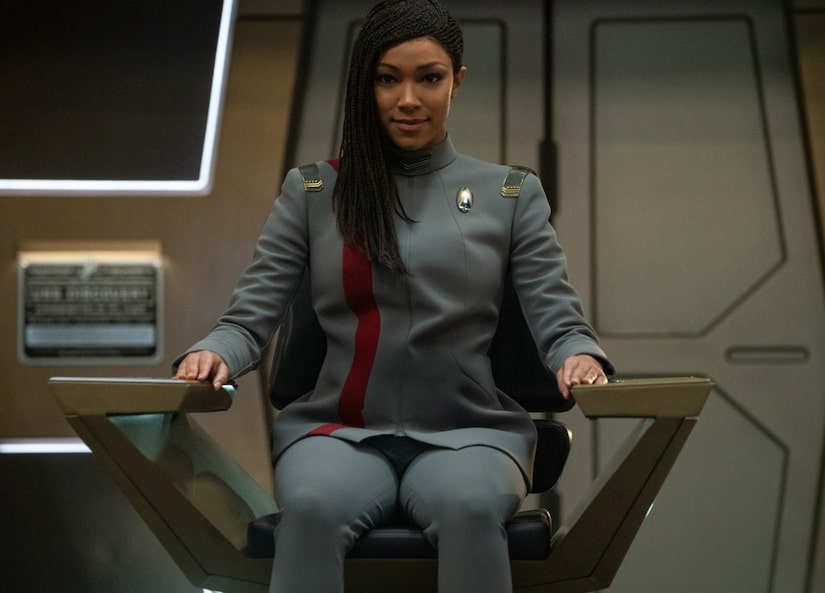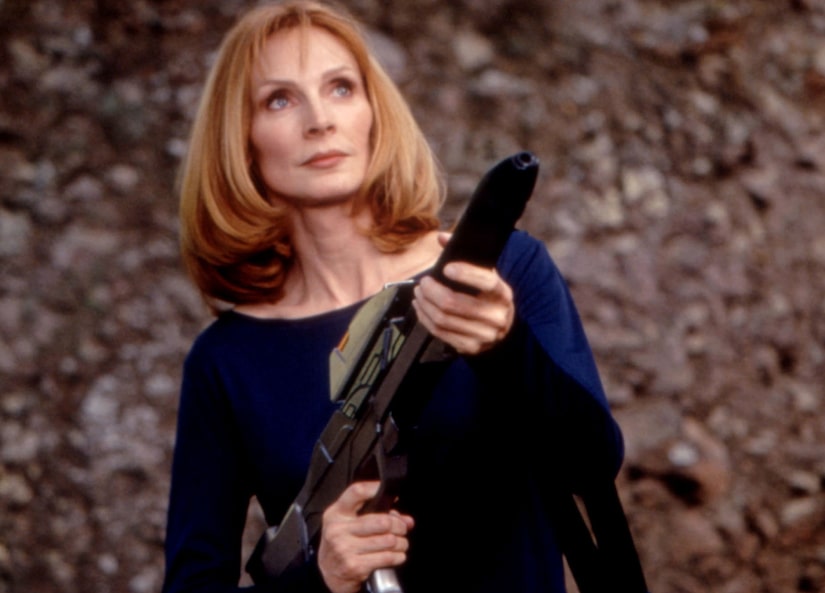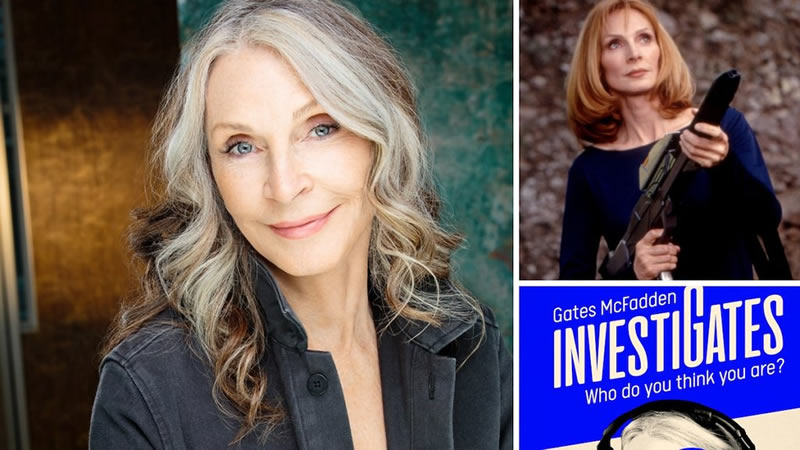She’s dying to appear on “Discovery” or “Picard”… but hasn’t been asked.
Despite having all the technological medical advances of the 24th century at her disposal — every Trekkie knows the most effective healing tool in Dr Beverly Crusher’s kit was that soothing, reassuring, calming voice.
But when told so, Gates McFadden lets it slip to laugh loudly in a decidedly Ohio accent.
“What’s funny is when I think about my voice like when I’m doing a narration, I really try to speak well and have the mellifluous voice,” she tells TooFab, slipping back into the doctor’s smooth tone. “But then when I’m talking to friends I talk like I’m from Midwest or whatever!
The actress, 72, not only has the perfect voice for her brand new podcast, she also has the perfect name: “Gates McFadden InvestiGates: Who do you think you are?”
In the conversational show, she sits down for intimate chats with friends and former co-stars, which of course, will include plenty of Enterprise crewmates. The first three episodes feature on-screen son Wil Wheaton, Lieutenant Commander Geordi La Forge AKA LeVar Burton, and Number One himself Jonathan Frakes.
The entire cast of the 19 Emmy-winning “Star Trek: The Next Generation” are on a group text, she reveals, where they ask each other questions and ask for opinions — but mostly send each other memes.
LeVar’s nomination as “Jeopardy!” host has also come up on the thread.
“Oh I think he’s it,” McFadden exclaims. “I mean we talked about it even before it was announced because my son had gone to school with Alex Trebek’s son, Matty, and so Jeopardy was in the conversation at different times, and I absolutely immediately went, ‘Levar you would be so perfect!’ and at the same time he was like ‘yeah I’d really like to do something like that.'”
McFadden, as it turns out, doesn’t consider herself a bona fide Trekkie (and yet is very well versed in lore outside her own series) as she rarely had the time to keep up with weekly sequels such as “Deep Space Nine” or “Voyager”.
However she does watch “Discovery” and “Picard” — both of which she deems excellent.
“Sonequa (Martin-Green) is amazing,” she declared. “I just thought the casting was superb! I’m really into that show.”

“I watched the first season of Picard, I think everyone is pretty brilliant in that,” she added.
Bafflingly, the only reason McFadden hasn’t appeared on either show, is because she hasn’t been asked.
“I simply would love to be on Discovery, I’ll tell you that,” she said. “To do any scene — I’ll be an alien. I’d love to go head to head with Sonequa, I think she’s pretty awesome. And of course I would love to be on Picard!”
“I’m game for anything. I think there’s something about now being the age I am,” she said, adding that her time has freed up now that she is no longer running the non-profit theater she helped build in LA, which was a “24/24 job.”
“So now I’m opening up to a whole lot of things right now. Like the podcast! Which I never thought I’d do. But I like learning new things, I like being in new situations… that’s what life’s about, really.”
Fans would surely snap up a return of Chief Medical Officer Beverly Crusher (and especially that ‘are they?/aren’t they?’ chemistry with Captain Picard)… so why doesn’t she simply call and ask?
“Well I just… that’s not me,” she sheepishly replies. “I don’t talk to producers that way… I don’t have their cellphone! People think it’s our decision… it’s not our decision!”
Her path to her most famous role was an interesting one: Having studied physical theatre in Paris under Jaques LeCoq, she was spotted by Muppet master Jim Henson, who was looking for an actress who could also help teach the physical demands required for his masterpiece “Labyrinth”, where she would go on to serve as Director of Choreography.
“I took Labyrinth though I was going to play Jennifer Connelly’s mother,” she lamented, “but British Equity would not give me my working papers to act. Which really was upsetting.”
“It’s one of those things… the Americans let the Brits act in so many things, but it doesn’t go the other way. There has to be a lot of American money in something. It’s very hard for us to get cast in things.”
She went on to land a number of other roles, including in Woody Allen’s “Hannah and Her Sisters” but lost them all in a skiing accident. Frank Oz would soon approach her to ask her to do the choreography for Audrey II — the man-eating plant — in “Little Shop of Horrors”, but she rejected it, telling him she wanted to return to acting. Not long after that, she landed TNG.
And her time there would not be smooth sailing either: Despite being one of the most popular characters of the pilot season, she was suddenly and unceremoniously replaced for season 2, by the gruff Dr. Katherine Pulaski, played by Diana Muldaur, after infamously clashing with co-executive producer and head writer, Maurice Hurley.
In light of Hollywood’s recent self-refection on how it has mistreated actresses, McFadden insists the controversy would not have gone down the same way today.

“I don’t think that it would happen in the same way, I don’t,” she said.
Looking back at the fallout, she explained how she inevitably arranged her own demise — by assuming she could get the same treatment as her male co-stars.
“It was a really product of coming off of the first series, which was definitely a very male-dominated series — the first Original Series. Wonderful series, don’t get me wrong: but very, very male,” she said.
“Obviously we were the transitional group, they wanted to have women in better positions and have bigger parts, but basically women still didn’t seem to talk to women together, unless it was talking about men.”
“I had come from a whole different background. I did not grow up in Hollywood, and know all of the business that way.”
While most of her acting friends had graduated from drama school and gone straight to New York to find an agent and fame, “I really wanted to change the world. And that’s why I followed Jaques Lecoq to France because he just seemed to synthesize a lot of ideas that I had,” she said. You were treated as an equal, directing, teaching, and involved in production meetings, she said.
“And suddenly you get to Hollywood — and it ain’t like that.”
“If I were a guy at that time, you could just hang out, and put your feet up on the producer’s couch, be funny and say hi. The guys could do it. Someone like Jonathan (Frakes) could do it.”
“But if I did it, it would been seen as ‘is she coming on…? what’s the deal?’ It makes people uncomfortable.”
“Now I see in my son’s age group — he’s just about 30 — they don’t care about stuff like that,” she said, adding that that generation do not discriminate based on gender or race as “people of my generation did. And that’s fantastic. But it just wasn’t like that.”
“And so I definitely stepped on people’s toes, and there was a particular writer/producer who I think I really irritated, because I was like ‘Well why can’t we have something like this? Why does the mother always have to be this way? Can’t she have conversations about technology with her son in different ways, and really be a mentor for him?'”
McFadden had taught stage combat, could perform all sorts of acrobatic roles, had studied fencing: “But I was rarely asked to do anything like that. Finally, in some of the later episodes… I think they probably got sick of hearing me complain, and probably let me do some of those things. That makes it fun.”
She says she realizes now there is a “tactically smart way” to suggest directions for a character… but she didn’t know at the time.
Irritated with her, she said Hurley insisted “either she goes, or I go. And they wanted to keep him.”
“I’ll never forget the night of the first season closing party,” she recalled. “I walked into the room with a big smile on my face, and I was like ‘Hi Maurice!’
“And he looked at me like ‘You are….’ There was a look, and it was like ice. And I went ‘Ooh.'”
Two days later, she was fired.
McFadden said she had “no idea” she was headed for the torpedo tube while working in the show. Stats showed she was the third most popular character, behind only Picard and Data. “Even Riker wasn’t as popular until later!” she laughed.
She does however, harbor no ill will towards her replacement.
“I had no bad feelings, it had nothing to do with her,” she said. “Gosh I’m sorry she had a rough time. No, she’s wonderful, I’ve seen her do other things. Of course it must’ve been awkward, for both of us, but I felt no malice towards her. Why would I? She didn’t say ‘Let’s get rid of that redhead!'”
But another twist of fate awaited after season two: Hurley was let go this time, and McFadden was asked to return. Patrick Stewart was the first one to call her and ask her to come back.
“I think it was good they went in another direction, because (Dr. Pulaski) was too much like Bones,” she mused.
“Times had changed, and there was so many single parents… I just wish that they had been able to use it as they did with as with Sisko on DS9, being a single parent and having real heart-to-heart talks with your child. I still have incredible talks with my son all the time,” she said, not just mother-to-son, but peer-to-peer as artists.
“(Star Trek creator) Gene Roddenberry felt sheepish because he had hired Maurice Hurley,” she recalled. “We had a big talk about it. He was like ‘as long as it works’; he was perfectly nice. But I don’t know how he felt about it. But I think it was Rick (Berman, incoming executive producer) and the new writers were more into bringing me back, that’s my hunch.”
“I know that the fans were incredible, and I was moved to tears by letters I got; I got thousands. I had no idea that people cared that much.”
But another lesson McFadden had to learn to her dismay was how long it actually takes to prepare scripts for such series — meaning her initial season 3 scripts were actually written with the very different Dr. Pulaski in mind… which resulted in “Crusher icing on a Pulaski character.”
“What I also didn’t understand is, I thought I was coming back as the exact same character,” she remembered. “But it takes a long time for these scripts to come in, so the scripts that they had for me in the beginning? They were Pulaski’s scripts. They were just sort of changing here and there to be Crusher.”
The irony of leaving because female characters are not being taken seriously, and then coming back to play the same female character but with a different interchangeable female character’s script, is not lost on McFadden. But, she now has the wisdom to look at it from the other side.
“It’s not all about you,” she admitted. “I take my hat off to them (producers). I could not have done it. It is an amazing feat that they accomplished all that. I was ignorant at the time of just the scope, of how hard it was to do that.”
When she herself is directing, and an actor makes a suggestion she isn’t sold on, but she agrees to it anyway, “seven out of ten times — they are right. And I am the first one to say ‘I was wrong, you were right – this is great.’ And that’s the way it should be, the creative process.”
“But you can’t always do that when you have 26 episodes a season. And that’s where I was clueless about the responsibility — the Herculean responsibility — to pull those episodes together and make all those decisions, with all those department heads.”
“Rick Berman did an amazing job, let’s be honest. You can’t be perfect. Nobody is going to be able to not have to say ‘no, we’re gonna do it this way.’ You have to do that eventually.”
But return Dr Crusher did, and she did get to take part in more action-filled episodes, including one of her finest — and arguably one of the entire series’ finest — “The High Ground”.
In it, the Enterprise is sent on a mercy mission to a war-torn planet to deliver medical supplies, but because of the Prime Directive, cannot interfere in the conflict itself. When a bomb goes off on the surface Crusher, against orders, insists on staying and treating the wounded — and she is taken hostage.
The controversial episode was banned in the UK and Ireland, primarily because of a scene in which android Commander Data, discussing examples of successful armed rebellion, cited the example of “The Irish Unification of 2024”.
“Oh I loved doing that,” McFadden recalls. “I loved it, and I couldn’t believe when it was banned in England. The thing is — and this is what was so irritating to me — Star Trek always looked at a problem or situation, and looked at it from all the sides, and then think about it. It doesn’t tell you what is the final right or wrong.”
“I disobeyed the Prime Directive by doing the Hippocratic Oath,” she went on. “It’s the idea of being able to look at a subject. And I couldn’t believe that they were that terrified — pardon the pun — of liking the terrorist group. It seemed ludicrous to me. Because if you are that afraid of a show like Star Trek, which really is such a well thought out show.”
“They were really trying to show that you could hold contradictions and ambivalence in your hand. You don’t have to always say this is right and this is wrong. Life is not like that, in my understanding of it. Life is filled with ambiguities. And you need the courage to look at things, and then decide for yourself how you feel about it.”
And should Data be correct about his Irish prediction (albeit not through terrorism), she declared: “That would be amazing.”


